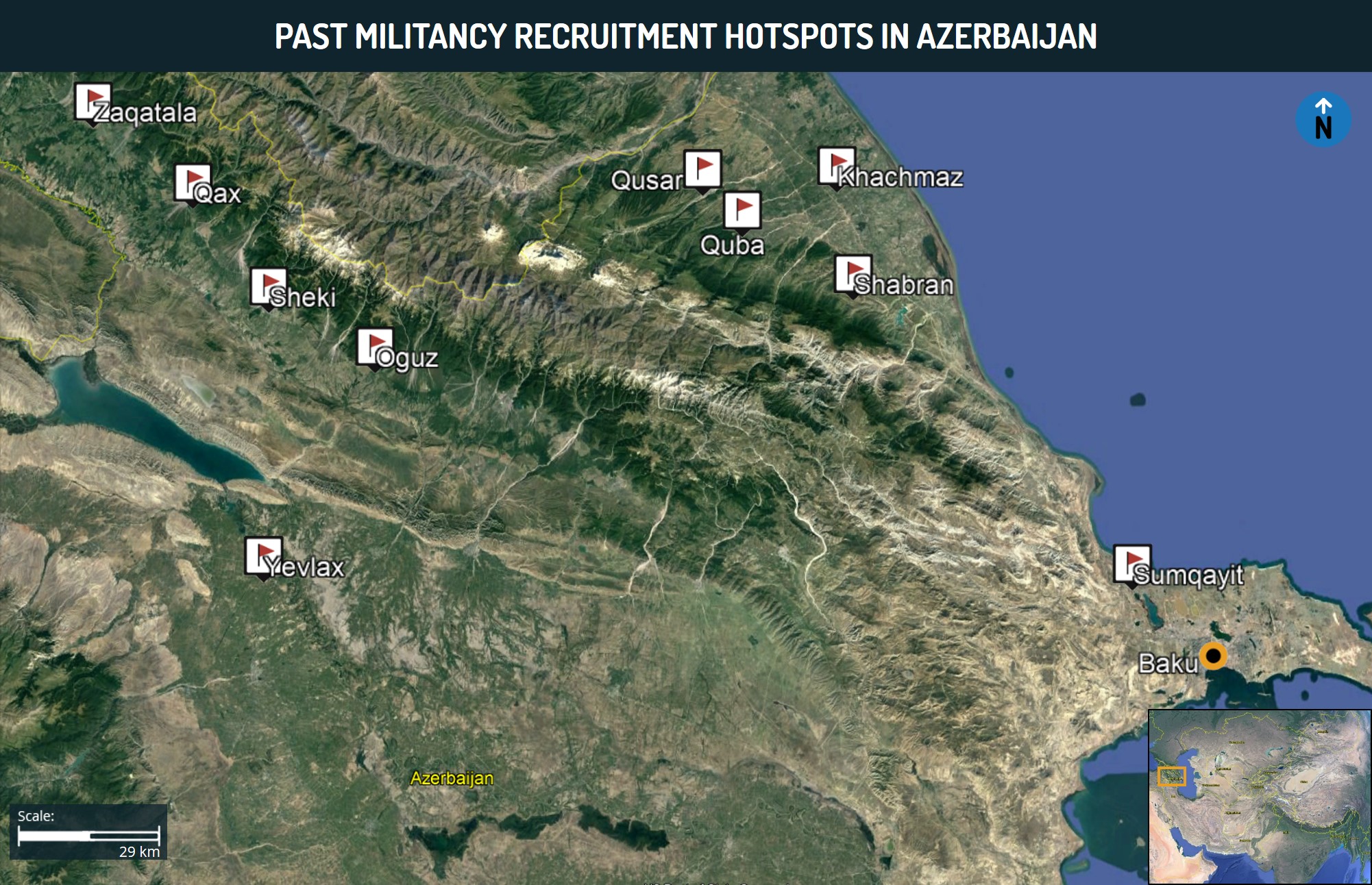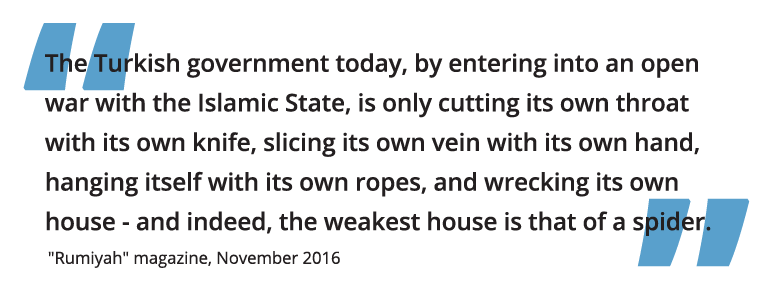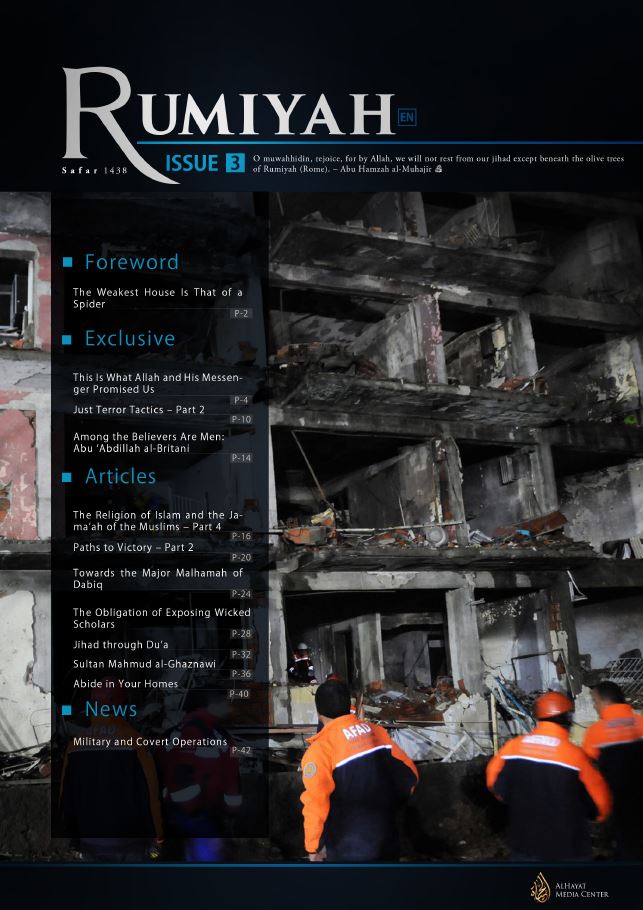Executive Summary
A recent propaganda series from Islamic State (IS) included a pledge video from Azerbaijan to the group’s leader on July 2.
While the capabilities of IS-inspired cells in Azerbaijan are limited, there is a potential that this video may sustain increased online messaging among disaffected Sunni youth, with the latent chance of culminating in lone-wolf attacks by sympathizers.
The government will step up its crackdown on potential radicalization, particularly in the country’s north, on unlicensed Islamic schools nationwide, and step up its monitoring of social media.
Travel to Azerbaijan can continue while maintaining vigilance due to the latent risk of crime and militancy.
Please be advised
Islamic State (IS) media released a video as part of its “The Best Outcome is for the Righteous” series on July 2. The video features three individuals believed to be from Azerbaijan pledging allegiance to IS leader Abu Bakr al-Baghdadi while calling on Muslims in the country to stage attacks.
In the video, the main speaker is identified as “Shaykh” Abu Yusuf al-Azeri. The individual provides an exposition of selected passages from the Hadith denouncing polytheism and calling for revenge for the alleged killing of Muslims.
In 2017, Azerbaijani State Security indicated that at least 900 citizens had traveled abroad and joined militant groups in Syria and Iraq. At least 250 have returned since, per independent estimates. State security officials also indicated in 2018 that dozens of Azerbaijanis have joined militant groups in the North Caucasus, while the number of those traveling to Afghanistan and Pakistan for the same purpose stands at 300.
Assessments
Video consistent with IS’ decentralization efforts, utilizing local appeal to push global message
The video gains significance when compared to the low frequency of official IS propaganda released involving Azerbaijan as the group’s on-ground presence in the country has been considerably muted. Given that it is the sixth in an ongoing series from the group’s affiliates across the globe, it stands to reason that this release is part of efforts by IS Central to increase propaganda in newer territories. This trend has grown since the release of a video featuring al-Baghdadi for the first time in five years in April. In Asia, the group’s recent declaration of Wilayats, or provinces, in India and Pakistan is consistent with these decentralization efforts. The media release is further notable as it is the only video in the series thus far which is not dedicated to a Wilayat but to a separate country. This may be an indication of IS’ long term ambitions in Azerbaijan and the South Caucasus as it attempts to further its regional presence.
The video appears to be made by local radicalized individuals with links to IS Central, possibly through networks facilitated by Azerbaijani foreign fighters. In terms of content, the speaker does not make explicit references to President Ilham Aliyev or the perceived local suppression of Muslims, but instead touches on more universal Salafist doctrines and provides general exhortations for attacks against unbelievers. Given that this is one of the first major IS videos on Azerbaijan in recent years, it is likely intended to establish the broad outlines of IS’ creed for possible new audiences in Azerbaijan and serve as an entry point for future propaganda engagement. However, a reference to the government’s cooperation with regimes abroad, particularly Iran, reiterates the close adherence to IS’ sectarian ideology with regards to the Shiite majority state as well as “crusader” Western governments. The overlay of stock images of US forces and of President Aliyev in talks with Russian President Vladimir Putin during the video are intended to underscore this message. It is also notable that the video ends with a bay’ah or pledge in Azeri, as opposed to Arabic. This minimal use of Arabic, apart from subtitles, is also intended to maintain local appeal.
Northern Sunni communities to be target of messaging, may result in increased online activity by disaffected youth
Azerbaijani foreign fighters in Syria have typically come from the country’s conservative Sunni communities in cities such as Sumqayit, Shabran, and Qusar. Police reports have also mentioned Khachmaz, Zaqatala, Qax, Yevlax, Oguz, Quba, and Sheki as notable hotspots for recruitment in the past. Mostly being border areas, radical elements may have crossed over to Russian territories in Dagestan to collaborate with actors who are a part of IS’ Wilayat Kavkaz. That said, the establishment of an active Islamist operational presence locally in Azerbaijan has been limited as a result of close state monitoring and preemptive security operations against suspected cells.
In this context, the recent messaging may presage a revival in messaging and online chatter, particularly among disaffected Sunni youth in the northern districts who may see the video as an encouragement to oppose the Aliyev administration’s crackdown on radical Islamic doctrines. Returning foreign fighters and those who attempted to travel to Syria but failed will likely be key influencers in this trend. This was noted in 2018 when a local named Eldaniz Mammadov was arrested and tried for posting pro-IS propaganda on social media platforms; the suspect is believed to have traveled to Syria at an unspecified previous time.
State response to focus on potential for radicalization on social media, unauthorized religious schools
It is important to note that at present, identified IS-inspired cells still remain marginal in numbers and have not demonstrated the capability for staging major attacks in the country. However, the video will raise concerns regarding the risk of lone-wolf attacks by sympathizers. Issues such as the state-controlled introduction of Islam as a subject in schools and universities in April may serve as flashpoints for disaffection as more conservative communities view this as an effort by the government to marginalize doctrines it perceives to be radical while increasing its hold on systems of religious education. As part of its crackdown, the Aliyev administration will likely step up its monitoring of suspected radicalized individuals across the country, making a series of arrests over the coming months.
The focus of the crackdown will include the closures of unauthorized Islamic theological schools and the detentions of Sunni Islamic scholars trained abroad as part of its continued efforts to prevent the influence of perceived external theology in the country. Measures will also include a scale-up of social media monitoring and tighter security along the country’s northern border to prevent the movement of radicalized individuals towards IS-linked interests in the North Caucasus. Tighter scrutiny into the movement of firearms and explosives material, particularly via smuggling networks in the north, is also expected to follow. Areas such as Khachmaz and Qusar Districts will particularly draw the focus on the security apparatus, given the operations of Sunni extremist groups such as the Khachmaz Jamaat.
The government is also liable to step up its coordination with neighboring states on counter-militancy strategies. Typically, the Aliyev administration has used counter-militancy as a means to forge common ground with economic allies, such as Turkey and Russia. The country is also an ally in NATO’s efforts in Afghanistan, providing airspace to cargo transportation for peacekeeping operations. The mention of Iran in the video and IS’ sectarian orientation will raise concerns regarding the possibility for plots targeting the country’s Shiite-majority. Such intentions, while not IS-linked, have been noted among Sunni extremists who have previously sought to target Shiite places of worship, such as the Meshedi Dadash Mosque in Baku. Closer security coordination between Tehran and Baku and a crackdown on smuggling networks along the southern border can also be expected in the foreseeable future.
Recommendations
Travel to Azerbaijan can continue while maintaining vigilance due to the latent risk of crime and militancy.
Avoid posting content that may be perceived as controversial or anti-state when operating or residing in the country due to the risk of prosecution.
Avoid all travel to border areas near the disputed Nagorno-Karabakh region due to continued ceasefire violations and the risk of conflict.


